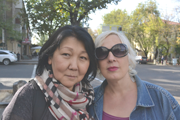The Manas Epic
Recited by the Kyrgyz manaschi (epic singers) Rysbek Jumabaev in 2003 and described by Rysbai Isakov in 2005. Translated and told by Dr. Helen M. Faller.
The Quarrel of Almambet and Chubak[1]
From the sky-blue field clad in a sheepskin coat mounted on his horse Kökala, arrayed in arms, his sword, as always, secured to his side, appears Chubak, the descendent of Akbalta. Of enormous height and shoulders broad, his handsome countenance bestowed by God. He speaks to Almambet these words.
“In those days when in the wide Talas Valley,[2] together in arms stood the Argyn, Kyrgyz, and Nogai.[3] By day they amused themselves drinking kymys.[4] By night virgins played for them.
“In those days, Chinese slave,[5] my neck was encased in a collar. And I worshipped you like a god. Before your journey to Beijing, you evil Chinese slave, I requested, “Take me with you.” I pleaded with you then. Where is that oath you made to God? And where is that letter that you wrote?
“Eh, cruel fate, Chinese slave, when I set out on the road to the stalwart city of Beijing, you remained in the rear-guard and did not think of me.
“You, guileless Chinese, turn the head of your horse. Stay where you are and take heed! When you move in the avant-garde, without thinking or guessing, should I be in the rear-guard?
“Chinese slave, do you heed my words? They approach Beijing by five different routes. Do you agree, Chinese slave, that I should go there as well?”
Attacking Almambet spoke the hero Chubak.
Then Almambet said some words.
“Eh, cruel fate, my dear Chubak. Set out in the avant-garde and lead the soldiers to Beijing. Only do not scream at me all the time ‘Chinese.’ Go and take as a trophy Burulcha, the daughter of Esenkhan and the Chinese governor’s daughter, Birmyskal, for yourself as prizes,” spoke in response Almambet.
And then Chubak began once more attacking Almambet again and again.
“You filthy pagan, Chinese slave, cruel fate, be damned! Thus it turns out that you to the khan of the Chinese people were thinking of fleeing? You filthy pagan, Chinese slave, maybe I should smash your fort? Or having freed your spirit from your body rip out your belly?
“The horde has many tribes of Turks. And so you wanted to leave us. You were thinking of fleeing to the Chinese khan? Taking with you the hero Syrgak.”
Thus the impassioned Chubak said these words to Almambet.
And in that moment the brown eyes of Almambet flashed and narrowed with anger. His face became so white his freckles disappeared. And at that moment on Almambet the heavens collapsed, as if all at once he perceived sixty dark thoughts.
And he said to the hero:
“Oh, think about it, Chubak. For whom do I attack Beijing? For whom do I advance upon the Chinese? Ah, think about it, Chubak! The great leaders of China I was one of their sons. The military leaders gallant and brave one of their sons I was.
“Like you, I left my father in my land and moved to Talas forever. I became a knight for the Hero Manas. So wherein lies our dispute, I do not understand, Chubak?! Seemingly pre-ordained by god, since you disavow my faith. I came from the Chinese khan to Talas in service to the glorious Hero Manas. Therein lies my fate!
“With my soul I embraced your faith and customs. Here where people do not relieve themselves sitting down, and the wings of their robes do not sweep the ground. I converted to your faith, and worship the Kyrgyz guiding spirits Kalyipa and Sultan.
“What a clumsy oaf are you, Chubak! Whom have I asked to make me khan?”
Thus spoke Almambet, prancing on his steed Sarala, Golden Almambet blanched in anger.
And thus the freedom-loving warriors could no longer contain their feelings of enmity. And they each bared their swords as if to attack.
At that very moment arrived the Great-Souled Manas. The hero understood everything in an instant. In their anger and passion, you see, the warriors could kill each other. And so the Great-Souled Manas separated them. And they were reconciled forever after.
The Story of Kozkaman
Before Manas was born, the Kyrgyz were defeated in battle so many times that they were no longer united as a people. They have scattered. And Kozkaman, the brother of the father of Manas, went to live with the Chinese. Once Manas is born and has united the Kyrgyz, the Chinese become desperate in their desire to destroy the people of Manas. They tell Kozkaman that they will grant him half of the Chinese Empire, should he destroy the Hero Manas.
So Kozkaman sends a letter to Manas telling him of his plans to return home to Talas with his sons. Manas welcomes Kozkaman and his family with open arms and provides them with everything they need. Only Queen Kanykei, Manas’ wife and a fierce warrior in her own right, is suspicious of Kozkaman. Eventually, Kozkaman gets Manas to visit him in the yurt that Manas has given him. Kozkaman offers Manas kymys to drink. The fermented milk is laced with a poison forty years old and so strong that just a whiff of it would kill a normal man.
Manas drinks the kymys down and begins to succumb to its power. He feels sorrow at dying alone far away from those he loves most and begins to speak their names out loud. One of the forty choro Manas mentions hears his name called as he is passing by Kozkaman’s yurt and rushes inside. He begins to fight the enemy as it surrounds the Great Manas.
Kanykei hears her name and comes riding over on her horse Taytoru, ready for battle. Just at that moment, however, the choro drags her husband out of the yurt and throws him over the back of Taytoru. Kanykei gallops off with Manas slung over the rump of her horse. The hero’s life is saved.
Kökötöy’s Memorial Feast[6]
In those times when Khan Kökötöy[7] left this life for the other world, for the place from which there is no return, his son Bokmurun (Shit Nose) had just turned 12 years of age. Ignoring the behest of his father and the counsel of his elders, Bokmurun moved far away to the valley of Üch Kapkak,[8]on the banks of the Ükürchü River, in the Karkyra Expanse.
Without permission Bokmurun decided to host a memorial feast for his father. And he did not invite the Knight Manas to the feast. And he did not listen to wise Koshoi[9] Khan. To the four corners of the earth he sent his horse Maaniker[10]to gather the people for the memorial feast in honor of Kökötöy.
Guests came to the feast from Orchun, Kokand, and Margilan. Shayik Kökjeke and split-bearded Synjibek from Andijon came. From came Margilan Malabek, from Kokand Kozubek, representing six cities, Alybek, from Bukhara Temir Khan, from the Afghans Aqunkhan, from the Kazakhs Khan Kökchö. All came to the feast.
Summoned by Shit Nose from Urumkan came Kökböru, master of the clay lands, raised in the sands of The Kara-Kum Desert. Armed to the teeth from Budaikhan’s territory came Muzburchak. Er Ürbü, the son of Eititkhan, whose land occupied two peaks of the Kemin Mountains,[11]came with a pair of raven-black horses.
Shigayikhan, the khan of Tekes, Jamgyrchy from the people of Eshtek, the khans Edigei and Teyish from the mouth of the wide Ile River,[12] Tuuchu khan, elected by the people of China,
arrayed in all his finery, Kongurbai, khan of the Kechil tribe, Neskara, ruler of the Manchu, Joloi, the Kalmyk khan, and Orookyr from the Soloon people – they all came.
All the khans came accompanied by their innumerable troops.[13]
And then still far from Üch Kapkak and Karkyra a countless number of the Chinese and Manchu people gathered. In Üch Kapkak there was so much meat it stood as high as the Ala-Too Mountains[14] and there was enough gravy to fill Lake Ala-Köl.[15]
And then Khan Neskara, who ruled the Manchu, said these words:
“Ah, cruel fate, Bokmurun, heed my words, foul Kyrgyz. Your mount Maaniker, give up Maaniker, foul Kyrgyz!
“He is like winged Pegasus. His mane and tail are simply luxurious. The like of which are not found among mixed breeds. Such a steed would increase the stature of our dignity.
“There is a good place for livestock in Beijing in good hands, in the care of knights. Heed my words, foul Kyrgyz. Give up Maaniker, foul Kyrgyz!
“If you will not give up Maaniker, I will not argue with you long. I will not eat your proffered meat.
“I was born in Bakburchun. About the glory of Maaniker, Kökötöy’s mount, I heard there.
“Foul Kyrgyz, the grievance against you is big. Lead Maaniker, standing here, to the khan of Beijing. Or give me grounds for my grudge. If you will not give me the steed, I will take the horse by force. I will destroy your people. And I will take away your horse.”
Bokmurun, son of Kökötöy, took fright at these words. His heart was pounding – it did not bode well. His native Talas was not close. And Great-Souled Manas was far away.
Bokmurun suddenly sees then black clouds in the heavens, sixty dark thoughts – all his fear.
And at that very moment, wise Koshoi took action.
Without letting anyone sense it, without letting anyone know, Koshoi harnessed Maaniker and sent the young messenger Aidar to request help from Manas.
In the distant land, in the Valley Talas, to the knight by the name of Manas Aidar took the important news.
While the Kyrgyz were preparing the memorial feast, at the same time, on the banks of the Ükürchü, in the valley of Üch Kapkak many troops of Chinese wanted to destroy them all, and increase suffering of the people.
And at this very moment, look you! The dobulbas[16] began to thunder. And the kernei[17] and the surnai[18] began to resound. Unexpectedly, like an encroaching mist, Leading his forty choro appeared the Hero Manas himself. Together with him came Almambet and Chubak and the young knight Syrgak.
To the Üch Kapkak Valley, in the expanse of the Karkyra, to the memorial feast of Kökötöy valiantly came Manas himself.
And when Manas arrived, all the Kyrgyz were filled with joy. And all the Kalmyk troops were enraged.
The Great Campaign: How the Troops Set Out
The theme of the Great Campaign is broad, and cannot be recited in one day. Subtitled “The Carnage” by some manaschi, the end of this episode tells the story of the culmination of the battles with the Chinese. After Manas is severely wounded, his forty choro fight on without him. The poem describes the exceptional bravery of one choro, twenty-one year old Syrgak. Syrgak is Manas’ first cousin – their fathers are brothers.
Illuminating us like the all-seeing moon, Great-Souled Manas, with a face like a ripe grain of wheat, his eyes resemble the evening mist. They shine on us like the sun and the moon. Born, our Manas, from an alloy of gold and silver. Born our Manas. No one else like him on earth.
Just as the big cat[19]approaches his prey from the side, grey-maned, tail held between his legs, Manas also attacks from the side.
It becomes clear that it is Allah’s behest, when from above descends what is pre-ordained, and only the son of god can fulfill it.
Great-Souled Manas, the big cat, left Talas with his army. He set out for the lands of the Chinese khan. If death overtakes Manas, then he dies. And he will see the place from which there is no return.
And thus with his innumerable troops and all twelve khans, Manas left Talas on his Great Campaign.
Having gathered a countless number of troops and collected supplies of provisions, Khan Koshoi headed the campaign. And following behind him came:
Kozubek from the Khanate of Kokand, Malabek of Margilan, Synjibek of Andijon, Alybek representing six cities, the leader of the Kazakhs, Khan Kökchö, and Budaikhan’s Muzburchak. And, at the same time, see, came Irbis of Eibittaz, and Ormonbek of Tekechi. From the Altai Mountains came Shygaikhan. From the Ile River Teyishkhan came, and Jamgyrchy from Eshtek.
And then if you look, you will see, Koshoi Khan of the Katagan tribe, who has gathered at his side an enormous mass of troops. And then if you look, you will see, dressed in a helmet of blue-grey, playing with his bluish shield, the aged Bakai himself leading the way. If he is in the rear-guard, then it is befits a great soldier. If in the avant-garde, then he brings victory.
And Almambet, Chubak, and the young Syrgak are marching. Chege, who beats the drum, has come. Oyoz plays the double-reeded flute. And Jaisang, the great singer of the Manas epic, is there. From the most honorable elders to the most respected fighters, all forty choro are here.
Blotting out all white light the dust rises up in columns. The white flag is held high. And the soldiers’ cries can be heard from afar. They march day and night. Eh, cruel earthly fate. Thus the enormous army of Manas came closer to the edges of Beijing towards Chaianduu,[20] by the very steppes where the heat beats directly on your brain.
And look you here! Where Alexander the Great left no trace, and the prophet Soloman gave no council, where the divine Hazret Ali never set foot, and Muhammed’s Chaliyar dared not make himself known. Thus ask you about what happened at Beijing.
The soldiers of Beijing, the stronghold of the Chinese, are always prepared to fight. The city is surrounded on all sides by a wall forty meters high. On top of the wall, look you now a net is entwined, and below, in the moat at its foot seethes boiling salty water.
The city of Beijing has forty gates. On one of them is emblazoned the all-seeing eye of Kutman. And written on each gates are these words:
“From now on until ever after no enemy foot will step inside.”
God’s light illuminates this place. It is no place to play. In China’s Beijing no soul hides unseen. Just as it is written on the gate.
Day had only begun to break. As Libra’s scales were setting in the west and light’s rays had only began to touch the earth. Ten thousand troops stood on the steppe of Chaianduu, stilled by night and sleep. One of the Chinese khans arrived. It was the mighty Khan Kongurbai. He brought with him countless soldiers. The Chinese swarmed everywhere. The earth simply could not hold them.
The whitish cloth waved like a banner. There was whistling and din all around. The bluish cloth waved like a banner. The pack was screaming all around. Such was the Chinese assault.
From that side then Manas’ soldiers stood in a solid ring. And everyone advanced to attack. Chege the dobulbas player hit his dobulbas. And Oyoz the surnai player gave the surnai his voice.
God keep us from witnessing this!
The bluish cloth stood then like a banner. The din and racket made your head spin.
“Khan Manas!” they yelled. The shout “Kyrgyz!” resounds from afar. It was a formation of Kyrgyz advancing to attack.
At that moment soldiers clashed in pairs. Fighting desperately, they pierced each others’ breasts with their spears. Their coats raised around their heads – oh, take care! With their swords they smote each other. In that battle pairs of soldiers fought on without lifting their heads.
And if you look, then you will see, the heavens are clear while the earth boils. Only Allah knows how to discern a sapling from the soil. Dust churns like water boiling on an icy surface. It is a terrifying sight to see such sufferings of hell. And in the fray it is not possible to distinguish any one knight from another.
God keep us from witnessing this!
At that moment, mounted on his horse, Sarala, the knight Almambet, Lion of Aziz Khan, screamed forth his terrifying cry.
Proclaiming, “Khan Manas!” Almambet began to fell countless Chinese to the left and to the right.
If you were to ask about Almambet, you see, he is one of those who came to request his own kingdom on the edges of Beijing. All the secrets of military affairs he knows like his five fingers. You see, he is not of the simple folk. His undergarments are of the finest silk.
Almambet came with soldiers to attack the Chinese, breaking hills and laying new roads. When this all took place, God did not know the limits of man’s rage. With a cotton string girdling his waist and his wide boots, Kongurbai, Khan of the Kechili, received an offer he could not refuse. Ai!
Arrayed in arms, his sword, as always, secured to his side, Kongurbai separated the warriors with his spear. He gathered the archers in a special detachment. Kongurbai began to prepare himself. In that seething skirmish, his rage overflowing, Kongurbai, directed the bridle of his horse Algar. He took charge of the battle.
And then if you look, you will see, among the horde of soldiers, Kongurbai caught sight of Almambet. At that moment our hero, Almambet, turning in a veritable whirl, was exterminating from back to front, boundless numbers of Chinese soldiers.
And then seeing him, Sir Kongurbai, shouted to Almambet:
“Eh, cruel fate, you renegade coward!”
“Having saddled his unworthy horse, Sarala, Almambet left home, that unworthy slave,” thought Kongurbai. “Having learned the wisdom of magic, that slave departed. His spear throw was the most accurate in all the universe.”
And thinking that if Almambet remains alive, he will destroy us to our very roots, Kongurbai came upon him in the midst of densely packed ranks. Having found him in the saddle of his horse, Sarala, he knocked Almambet to the ground. Khan Kongurbai attacked from the side.
At that moment, deprived of his horse, Sarala, with the exclamation “I am fallen!” Almambet lost hope of keeping his life. Having been thrown from his horse, Almambet fell to the ground.
And then an uncountable number of Chinese, surrounded our famous warrior, as if forming a ring.
At that moment, Sir Kongurbai, (Everything he does, he does his own way, just like a widow who loses her husband.) moved his mount, Algara, to one side. He galloped over to his soldiers faster than an arrow. And with the cry, “Hold him, hold him!” gave this order to his knights:
“Take this fugitive. Poke out his eyes. And break both his arms. Then drag him straightaway to the aged ruler of Beijing!”
At that point the weakened Almambet despaired for a moment. He did not know what to do. And then, roused to fury, Almambet grabbed by the sheath his golden sword that had descended from the heavens. A gift from Manas, as sharp as Ali’s sword, zulpukor. Almambet let his big cat spirit take charge and began fighting ferociously.
Almambet started defending himself on all sides. Upon those who wanted to capture him with a noose, he launched himself with his spear. Almambet had no intention of putting himself at the mercy of his enemies.
At that time the battle raged. The arrows flew just like a downpour of rain. The bullets whistled, falling like hail. Syrgak, descendent of Khan Ula, the clever, bold daredevil, finally reached Almambet.
Then our Syrgak spotted Almambet defending himself in the midst of a dense rank of soldiers. He turned the head of his horse.
With the cry “Ya-Allah!” and proclaiming the name “Hero Manas!” Syrgak jumped into the fray. When he looked in front of him he saw not earth, but a veritable flood of Chinese. And at that moment, look you, the Chinese engulfed him.
And then our Syrgak flew faster than an arrow. He grasped Almambet by the right shoulder and lifted him off the ground just like a little child. He threw him onto his horse, and to the envy of all the enemies, rode away with him from the field of battle.
Thus, Syrgak saved Almambet.
At that moment, all the Kalmyks were struck dumb. All the Chinese opened their mouths.
The arrows poured over them like a downpour of rain. The bullet fire began to descend like hail. Our heroes chased after them in pursuit.
The Great Campaign – The Arrival of Shypshaydar
The Arrival of Shypshaydar is also a sub-theme of the Great Campaign. Shypshaydar is the most powerful of the Chinese archers. He possesses supernatural qualities. After Shypshaydar arrives, twelve of Manas’ forty choro perish in battle.
The Tale of Taytoru
This is the story of a horse race. The action takes place 12 years after Manas’ death, in the city of Bukhara, now located in Uzbekistan.
After Manas dies, Kanykei, Manas’ widow and a fierce warrior in her own right, takes her infant son, Semetey, and flees Talas. She is concerned that Manas’ cousins, who assumed the throne upon his death, will attempt to take the baby’s life. So she flees to her birth city Bukhara with Semetey. The two are welcomed with open arms by Kanykei’s father Temir, King of Bukhara, and her elder brother Ismail. They are so warmly welcomed, in fact, that Ismail decides to raise Semetey as his own son.
Although Kanykei lives like a queen in Bukhara, her situation is quite tragic. The tongues of the people wag. They wonder why she has come back to Bukhara when she has been married into another people. The Bukharans spread rumors about her. For 12 years Kanykei thus suffers the loss of her husband. Semetey is also in a precarious situation. He doesn’t know that he is the son of the Great Manas. And he does not know that he is destined for great things.
Kanykei wants to go home to Talas with Semetey, but she fears that she and Semetey will not be received with open arms if they return to their native Kyrgyz people.
Semetey is now twelve-years-old. Because he is made of heroic stuff, he already has the strength and bravery of a full-grown man. But, his heroic qualities do not have an appropriate outlet. As a result, he starts to get in fights and occasionally kills people. His grandfather and uncle decide that something must be done. He must be put in the proper situation. They decide to make Semetey khan of Bukhara. A celebratory feast is held in his honor and the celebrations include a horse race.
Kanykei decides to enter her 60-year-old horse Taytoru in the race. If Taytoru wins, then she will take her son back to his birthplace. If the horse loses, then Kanykei’s hope of leaving Bukhara will die and she will commit suicide. And thus in this sorrowful situation, the spirits of Manas and his forty choro come to the aid of Kanykei and imbue the decrepit old horse Taytoru with the strength and speed he needs to win the race.
[1] Almambet and Chubak are two of the warrior Manas’ forty choro. Choro is a collective noun referring to the Hero Manas’ forty best knights and bravest fighters. Syrgak is another favorite choro. Manas is the central hero of the Manas epic, the ancient leader of the Kyrgyz people, and the khan – king – who united the numerous tribes of the Kyrgyz and played a progressive role in the founding of the Kyrgyz nation.
[2] Talas is the name of Manas’ homeland, located within Kyrgyzstan’s borders to this day.
[3] The names of three Central Asian tribes.
[4] Kymys is fermented mare’s milk, a great favorite in Central Asia.
[5] Almambet was the son of the Chinese khan who came over to the side of Manas. Chubak calls Almambet a slave, though he is royalty, to insult him.
[6] Memorial feasts are held in honor of someone who has died. They occur at specific intervals after the person’s death, typically three days, seven days, 40 days and one year afterwards.
[7] Kökötöy – khan of the Nogai Tribe, one of the many Kyrgyz tribes in ancient times.
[8] Üch Kapkak is a valley on the River Tekes located in southeastern Kazakhstan and surrounded by steep mountains.
[9] Koshoi – one of the main positive figures in the Manas; a wise and just old leader and a strong, unbeatable knight, despite his great age.
[10] Maaniker – a horse of unsurpassable strength and speed passed down to Bokmurun by his father Kökötöy.
[11] Kemin – a particularly mountainous region in Kyrgyzstan. This is saying a lot, since Kyrgyzstan is approximately 93% mountainous.
[12] Ile – a river that flows in Kazakhstan and China.
[13] Khans are supposed to arrive at a memorial feast without soldiers because they are peaceful gatherings. Since the khans brought their troops, it means that they planned to attack the Kyrgyz, not honor the great hero, Kökötöy.
[14] Ala-Too is a mountain range in Kyrgyzstan, considered the symbol of the Kyrgyz people.
[15] Ala-Köl – a mythical lake.
[16] Dobulbas – a traditional Kyrgyz drum used as a signal to begin battle or the hunt.
[17] Kernei – a traditional Kyrgyz wind instrument, also used as a signal instrument.
[18] Surnai – a traditional Kyrgyz wind instrument.
[19] The Kyrgyz word is kabylan – a general name for the big cats, including tigers, leopards, and panthers. In epics “kabylan” signifies the knight.
[20] Chaianduu – a toponym; in Kyrgyz it means “the place full of scorpions.”
Shopping Cart

Your shopping cart is empty
Visit the shop










